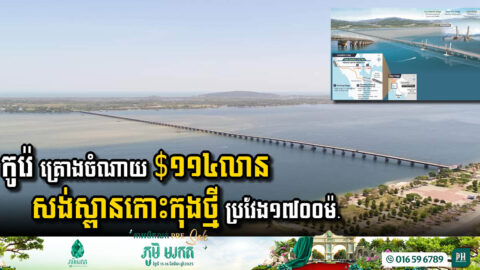Strengthening Economic Ties: Cambodia and India Boost Trade Relations
In a move to elevate bilateral trade relations, Cambodia and India have reported a significant increase in their trade volume, now exceeding $340 million. This announcement was made during separate discussions between Samdech Techo Hun Sen, the Acting Head of State of Cambodia, and H.E. Bawitlung Vanlalvawna, the Indian Ambassador to Cambodia, as well as […]
Council for the Development of Cambodia Empowers Subnational Investment Committees
In a significant move to streamline investment processes, the Council for the Development of Cambodia (CDC) has announced the delegation of authority to capital and provincial investment subcommittees to register investment projects under the Cambodian Investment Project Management System (cdcIPM). This initiative is set to take effect in the third quarter of 2025. On March […]
Gov’t Introduces Measures to Enhance Water Management in Cambodia’s Agriculture Sector
In a concerted effort to tackle the pressing challenges in water resources management, the Economic and Financial Policy Committee of Cambodia convened on March 5, 2025. The committee unveiled a comprehensive plan comprising three key measures aimed at improving water management within the country’s water and agriculture sectors. During the meeting, members deliberated on the […]
29 Community Water Stations Inaugurated in Banteay Meanchey Province
In a significant step towards improving access to clean water, 29 community water stations funded by World Vision Cambodia were officially inaugurated today. The ceremony was presided over by H.E. Chhay Rithsen, Minister of Rural Development, alongside other distinguished officials. H.E. Um Ratay, Governor of the Banteay Meanchey Provincial Governor’s Office, announced that these new […]
Cambodia Designates Lva Village in Battambang Province as Key Model Village
In a significant step toward rural development, the Cambodian government has designated the Lva village in Battambang province as a key model village. This initiative aims to enhance local living standards and promote sustainable development in rural areas. On March 3, 2025, His Excellency Chhay Rithsen, Minister of Rural Development, led a delegation to inspect […]
Korea-Backed USD 114 Million New Koh Kong Bridge Project Moves Forward with Feasibility Study
Five major Korean investment firms are currently conducting a feasibility study on the ambitious Koh Kong Bridge and National Road 48 upgrade project, which carries an estimated cost of USD 114 million. The project is expected to enhance connectivity between Khmer Rouge City and Cambodia’s western border, significantly improving transport infrastructure in the region. This […]



 ខ្មែរ
ខ្មែរ







